 Today’s guest is a fellow member of Sisters and Crime and President of Sisters in Crime Colorado Chapter. I love this article which stems from a beginning writing rule we writers hear relentlessly, “Write What You Know.” I’d like to toss out another quote I think writers should weigh when it comes to fearless creating: “What rules?” Please welcome Author Rhonda Blackhurst ~ Donnell
Today’s guest is a fellow member of Sisters and Crime and President of Sisters in Crime Colorado Chapter. I love this article which stems from a beginning writing rule we writers hear relentlessly, “Write What You Know.” I’d like to toss out another quote I think writers should weigh when it comes to fearless creating: “What rules?” Please welcome Author Rhonda Blackhurst ~ Donnell
By Rhonda Blackhurst
“Write what you know” has been attributed to Mark Twain; however, in reading his books, it’s apparent—and good, in my opinion—that he didn’t always follow that advice. Nevertheless, the suggestion has swirled around the writing community forever. And while I follow that adage to a point, if it’s followed like other writing “rules,” it can lead to dull and limited writing. One of my favorite quotes about writing what you know is from Ursula K. Le Guin:
“As for “Write what you know,” I was regularly told this as a beginner. I think it’s a very good rule and have always obeyed it. I write about imaginary countries, alien societies on other planets, dragons, wizards, the Napa Valley in 22002. I know these things. I know them better than anybody else possibly could, so it’s my duty to testify about them. I got my knowledge of them, as I got whatever knowledge I have of the hearts and minds of human beings, through imagination working on observation. Like any other novelist. All this rule needs is a good definition of “know.”
I love it! What you know is really only as limited as the lengths your imagination will take you. I’m a plantser (a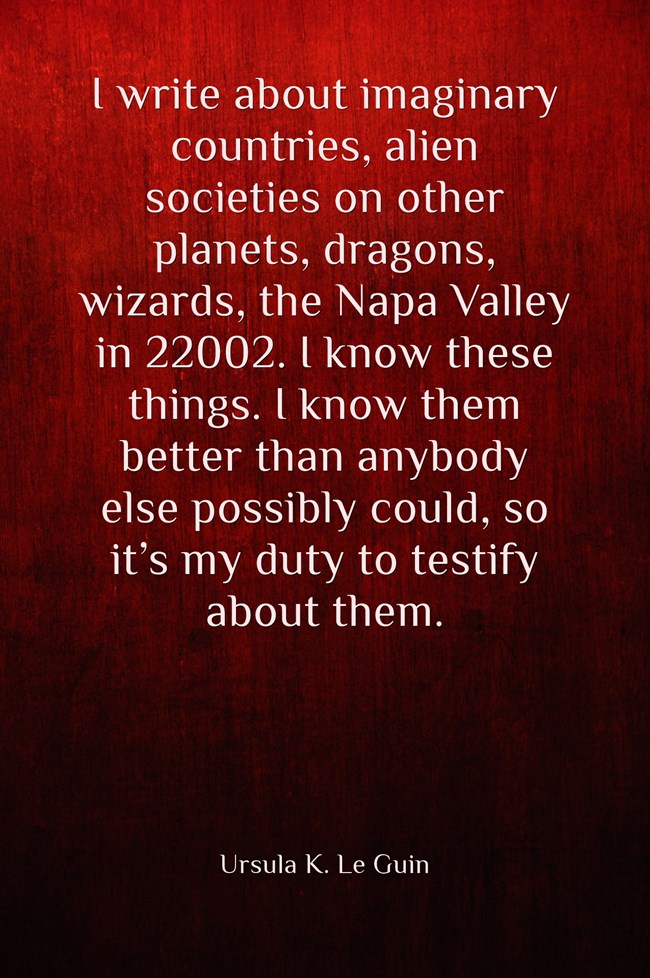 cross between a pantser and a plotter), so when I start a story, I have only a vague idea of where it will take me. My imagination and the characters lead the story. That allows for twists and turns that extend far outside the scope of what I know by experience and takes me into the territory of what I want to know whether it be about a job, location/setting, conflict situations, or anything else that interests me.
cross between a pantser and a plotter), so when I start a story, I have only a vague idea of where it will take me. My imagination and the characters lead the story. That allows for twists and turns that extend far outside the scope of what I know by experience and takes me into the territory of what I want to know whether it be about a job, location/setting, conflict situations, or anything else that interests me.
“A lot of people say “write what you know.” I feel like it is so difficult to stay intellectually engaged for a year or two in a subject. You should write something that you need to go and learn about. Make the writing process a learning process for you.” Dan Brown
If money and time permit, I—as well as most authors, I suspect—prefer boots-on-the-ground research. That said, with the internet literally at our fingertips and always available, research is easy—and fun!—to come by. And research is one of my favorite parts of the writing process. As to writing what I know, in the Melanie Hogan Mysteries, the protagonist owns a hair salon and much of the story is set there. As a past stylist and salon manager, I had great fun revisiting those days. And while hair styles and products constantly change, the salon environment has stayed consistent—smells of chemicals, sounds of hair dryers, laughter, some bickering, and juicy gossip. And what could be better to forward a story than gossip?! So the foundation of what I know by experience is the springboard for what my imagination “knows.” The seventh—and final—book in the series, Shear Misfortune, was released April 11th.
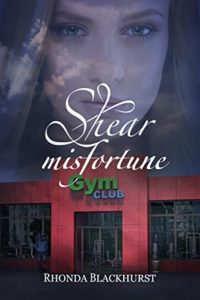 About Shear Misfortune: When a fitness center is a locale for both health and murder, exercise enthusiasts must weigh their odds of the outcome.
About Shear Misfortune: When a fitness center is a locale for both health and murder, exercise enthusiasts must weigh their odds of the outcome.
Along with best friend and salon co-owner Claire Davis and Melanie’s beau Detective Levi Wescott, they set out to clear her name while Melanie practices resistance training—resisting going to the gym to investigate. When the police eventually zero in on a salon employee, the team joins forces, getting a life-or-death workout. Will they all survive?
The series I’m working on now, the Spirit Lake Mysteries, is a spinoff from the Melanie Hogan Mysteries with visits from some of the same characters but with a new setting and protagonist. Andie Rose has inherited the Spirit Lake Inn and runs a side business out of an office there as a life coach, another profession I know. I have twenty-plus years in the law enforcement arena working with victims of crime from a first responder to helping them get restitution owed, to assisting them through the court process. As a certified life coach with a niche in helping people who have experienced any type of life catastrophe turn from victim to victor, I’ve come full circle and now get to show them how to make what happens to them work for them.
This knowledge guides my protagonist in her role. Most of what happens to her, however, will veer into things I have not experienced or encountered, which will make way for endless possibilities. There is also a nun for a sidekick and some ghost activity, two things I know only by old-fashioned research and a whole lot of imagination. If I’m in any way held accountable for facts of an issue, however, I do my due diligence and get correct answers. That said, some of my storylines about police behavior drives my retired police chief husband a bit crazy. I just remind him it’s for the sake of the story and more accurate than most of the television shows we watch. To which he cannot argue.
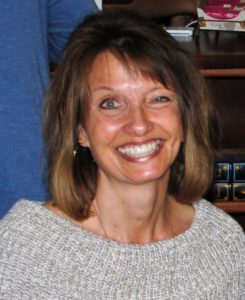
Author Rhonda Blackhurst
About the Author: Rhonda Blackhurst was born and raised in northern Minnesota and now resides in Colorado. She is an avid reader, writer, lover of words, and a dark chocolate connoisseur. Her writing career began at the tender age of four when, much to her parent’s dismay, she began writing with crayons on the knotty pine walls of the family home. Her novels include: The Inheritance, a Hallmark-style fiction stand-alone; The Melanie Hogan Mysteries (Shear Madness, Shear Deception, Shear Malice, Shear Murder, Shear Holiday Mayhem, Shear Fear, Shear Misfortune, and Shear Camping Caper (a short story); the Whispering Pines Romantic Suspense duology (Finding Abby and Abby’s Redemption). She has a non-fiction book, Finding Peace Through Gratitude, under pen name Alexandra Benn. She is also an indie author consultant and a certified life coach, teaching clients how to master their life rather than life mastering them.
Connect with me at:
Rhonda Blackhurst – Author & Life Coach
Beacon of Balance & Change, LLC | Facebook
Rhonda Blackhurst (@rhonda.blackhurst) Instagram


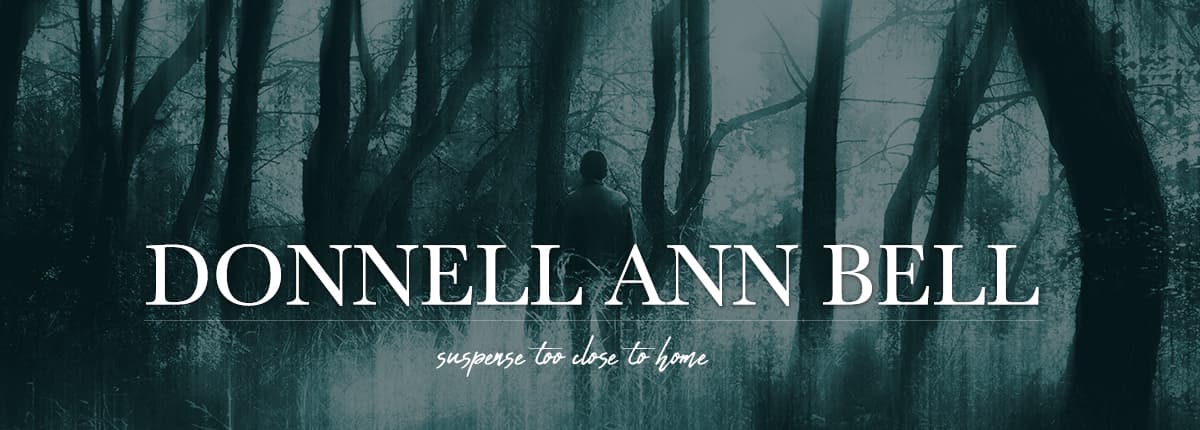
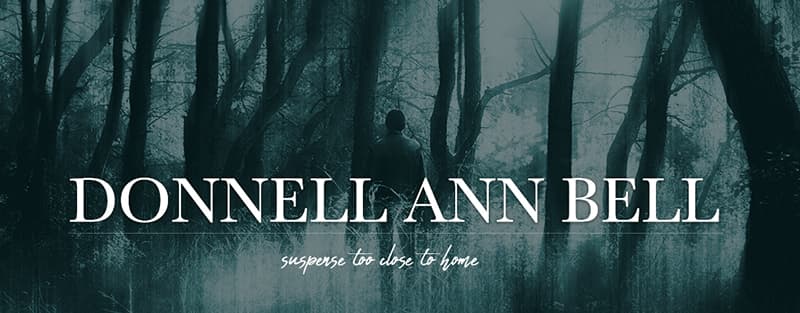







Rhonda, I don’t know about the other readers, but I found this post freeing. Thank you for joining me on Help From My Friends Friday! Best wishes with Shear Misfortune and the other books in your series. I have added them to my “To Be Read” list!
Thank you for having me, Donnell! It’s truly an honor. 🙂
I loved this blog—best article on how writing what you know can springboard into writing what you want to learn about. So we’ll said, Rhonda. I think we’re in times as writers where the pressure to ‘stay in your lane’ is sometimes palpable. Do your sound research and then go for whatever path, lane or world your imagination beckons!
You zeroed in on what I focused on, too, Sue. Loved that insightful comment from Rhonda. She must be an exceptional life coach!
Thank you, Sue and Donnell! I love how one point can elicit multiple views–we all “know” different aspects of the same thing. haha!
I love this post, Rhonda and Donnell! I embrace write what you know or what you can research thoroughly, so my books are a combination of both. Thanks so much for all the lovely quotes and for sharing your perspective on the subject, Rhonda. I really enjoyed reading this!
Thank you, Margaret. Your books reveal a LOT of research and are fantastic!
A topic close to every writer’s heart. Thanks for a good article!
Thank you, Karen. As a prior paralegal, in your Dinner Club Murder Mysteries, you got to write what you know with a lot of fun twists and turns. 🙂
Maybe instead of telling writers “write what you know,” we should tweak that adage a bit to state, “Write what you know, but if you want to write what you don’t know, first do the research.” Great post!
Great point, Lois! Thank you. 🙂
I remember reading Ursula K. LeGuin’s comment about this rule, and how liberating it felt. I write what I want to know about, want to explore. The best stories I come across have the same quality of discovery, of the author breaking out of the obvious limitations.
Great word, “liberating.” I remember the first time I heard, Write what you know. I know a little bit about so many things, I almost gave up right then and there. Rhonda nailed it.
I agree with Donnell. I love the word liberating! Thanks, Susan.
I love this and agree with Dan Brown’s statement, “…Make the writing process a learning process for you.” I love giving character’s occupations I have to research, and I learn something new and hope my readers do too. As well as writing about a culture that isn’t mine, but I am fascinated about. Great post! Thanks!
Excellent points, Paty, thank you!
Thank you, Paty! 🙂